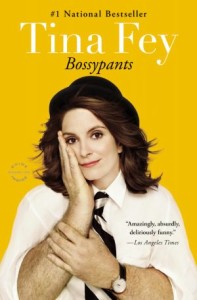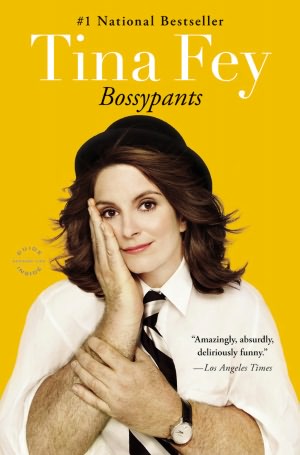 Dear Tina Fey,
Dear Tina Fey,
Can we be friends? Check one:
_____ Yes.
_____ Probably not (but maybe).
_____ We already are.
Sincerely,
Arleen Spenceley
is what Tina Fey would read if I were to send her a note in response to Bossypants, her bestselling book (which is the seventh book I’ve read in full in 2012). As a fan of the show 30 Rock, of the movie Baby Mama and of Fey’s ridiculous (in a good way) portrayal of Sarah Palin on Saturday Night Live in election season 2008, I dove into the book expecting to love it. Which I did. But if you are not already a fan of Fey’s work, fear not: When you read Bossypants, you will love it, too, assuming you a) can handle the occasional f-bomb and b) are a person who appreciates funny things.
It is because of Bossypants that I laughed with reckless abandon and possibly choked on a pretzel stick, both in public places. So, if you are eating pretzel sticks, I suggest you finish them now before scrolling down, where you’ll find five of my favorite excerpts:
I totally agree with this:
“When I was a kid, there was a TV interstitial during Saturday morning cartoons with a song that went like this: ‘The most important person in the whole wide world is you, and you hardly even know you. / You’re the most important person!’ Is this not the absolute worst thing you could instill in a child? They’re the most important person? In the world? That’s what they already think. You need to teach them the opposite. They need to be a little afraid of what will happen if they lose the top of their Grizzly Adams thermos.” -page 54
On sexism at the improv theater where Fey worked in Chicago:
“In 1995, each cast at the Second City was made up of four men and two women. When it was suggested that they switch one of the companies to three men and three women, the producers and directors had the same panicked reaction. ‘You can’t do that. There won’t be enough parts to go around. There won’t be enough for the girls.’ This made no sense to me, probably because I speak English and have never had a head injury. We weren’t doing Death of a Salesman. We were making up the show ourselves. How could there not be enough parts? Where was the ‘Yes, and’? If everyone had something to contribute, there would be enough. The insulting implication, of course, was that the women wouldn’t have any ideas.” -page 87
It surprises me that the following came from something that is not one of my textbooks. In any situation in any relationship, be it actor/director, husband/wife, parent/child, stranger/stranger, there is always a “core reason,” as Fey calls it, that somebody says or does something. I’ll add that a person’s “core reason” is sometimes not within his or her own awareness, and usually not within the awareness of the other person affected by it. Make it a goal to find your core reasons and express them. It reduces stress by at least appx. 43% for everyone.:
“And then sometimes Actors have what they call ‘ideas’. Usually it involves them talking more, or, in the case of more experienced actors, sitting more. When Actors have ideas, it’s very important to get to the core reason behind their idea. Is there something you’re asking them to do that’s making them uncomfortable? Are they being asked to bare their midriff or make out with a Dick Cheney look-alike? (For the record, I have asked actors to do both, and they were completely game.) Rather than say, ‘I’m uncomfortable breast-feeding a grown man who I just met today,’ the actor may speak in code and say something like ‘I don’t think my character would do something like that.’ OR ‘I’ve hurt my back and I’m not coming out of my dressing room.’ You have to remember that actors are human beings. Which is hard sometimes, because they look so much better than human beings. Is there someone in the room the actor is trying to impress? This is a big one, and should not be overlooked. If a male actor is giving you a hard time about something, you must immediately scan the area for pretty interns.” -page 122
On men who say women aren’t funny:
“Unless one of these men is my boss, which none of them is, it’s irrelevant. My hat goes off to them. It is an impressively arrogant move to conclude that just because you don’t like something, it is empirically not good. I don’t like Chinese food, but I don’t write articles trying to prove it doesn’t exist. So my unsolicited advice to women in the workplace is this. When faced with sexism or ageism or lookism or even really aggressive Buddhism, ask yourself the following question: ‘Is this person in between me and what I want to do?’ If the answer is no, ignore it and move on.” -page 144
Both Fey and her husband remind me of me:
“I turned to domestic violence only once. We were going to bed a 3 a.m., knowing we’d have to get back up at 5:30 a.m., and my husband kept talking and talking as a joke when I was trying to fall asleep. His exhaustion had given him the giggles, and he kept poking me and waking me up saying things like ‘Hey, I gotta ask you one more thing. Do you like pretzels?’ I flew off my pillow and shoved him so hard across the bed that I saw genuine fear flash across his face. It was one of the very few ‘deleted scenes from Star 80‘ in my life.” -page 189
– – – – –
Click here for more about Bossypants.
Click here to read about all the books I read in 2012.

